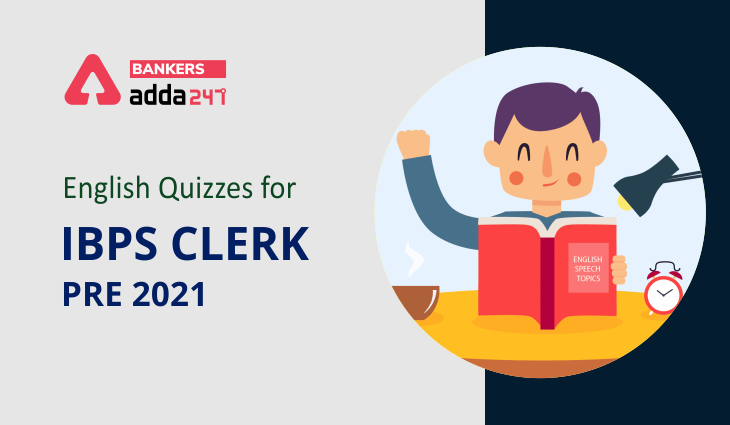
TOPIC: Error correction
Direction
(1-15): Read
each sentence to find out whether there is any grammatical or idiomatic error
in it. The error, if any, will be in one part of the sentence. The number of
that part is the answer. If there is ‘No error’, the answer is (e). (Ignore
errors of punctuation, if any.)
Q1. Don’t talk to (a)/ him, he always
(b)/remains in temper (c)/ these days. (d)/ No error (e)
Q2. People in Darwin (a)/ had become so
accustomed to cyclone warnings (b)/ that few of them paid any attention to the
radio warnings (c)/ which began this morning. (d)/ No error (e)
Q3. This is (a)/ the most important (b)/
question which you have (c)/ to prepare very carefully. (d)/ No error (e)
Q4. Brahmaputra is (a)/ one of the
longest rivers (b)/ that originate (c)/ in the Himalayas. (d)/ No error (e)
Q5. The trees in a forest (a)/ must be
properly counted and numbered (b)/ and proper entries be made (c)/ in the
register. (d) / No error. (e)
Q6. The majority of the woman (a)/
teachers are persuading (b)/ the principal to consider (c)/ their demands. (d)/
No error (e)
Q7. These type of books (a)/ are
certainly helpful to the students (b)/ preparing for the banking (c)/ service examinations.
(d)/ No error. (e)
Q8. I have been adoring (a)/ her for
(b)/ the voice with (c)/ which she is gifted (d)/ No error. (e)
Q9. Our leaders should (a)/ not let the
criminal (b)/ activities to grow (c)/ in our country. (d)/ No error (e)
Q10. Going towards them (a)/ with some
cups of (b)/ tea in the tray, somebody knocked (c)/ at the door. (d)/ No error.
(e)
Q11. He is almost quite competent (a)/
for the post of Manager; (b)/ so when given a chance, (c)/he can lead the
company to its goal (d)/ No error. (e)
Q12. He asked me (a)/ that why I was
(b)/ not preparing for the (c)/ Civil service Examinations (d)/ No error. (e)
Q13. It was almost (a)/ ten years ago
since he wrote (b)/ a letter to me to (c)/ remind me of my lapses (d)/ No error
(e)
Q14. By whom (a)/ was he helped (b)/
when he seriously wounded(c)/ by a terrorist? (d)/ No error (e)
Q15. She held something (a)/ at her side
which (b)/ was totally hiding (c)/ by the folds of her sari. (d)/ No error. (e)
ALSO CHECK:
S1. Ans. (c)
Sol. In place of ‘in temper’, use ‘in a
temper’ which is idiomatic.
S2. Ans. (e)
Sol. Sentence is grammatically correct.
S3. Ans. (b)
Sol. Use ‘a’ in place of ‘the’. Until
there is no comparison between two or more than two persons or things, we don’t
use adjective of superlative degree. ‘The most’ is used in superlative degree
whereas ‘a most’ is used in positive degree. In such situation, ‘most’ means
‘very’. Ex. (i) You are the most
powerful man in this party. (ii) You are a
most powerful man. In the first sentence, ‘you’ is compared to other
members of the party, whereas in second sentence ‘you’ is not compared to
anyone. In this ‘a most’ means ‘a very’.
S4. Ans. (a)
Sol. ‘Brahmaputra’ is the name of a
river. Hence ‘The’ will be used before ‘Brahmaputra’.
S5. Ans. (e)
Sol. Sentence is grammatically correct.
S6. Ans. (a)
Sol. Use ‘women’ in place of ‘woman’ as
in compound nouns made of ‘man’ or ‘woman’, plural form is used in both the
parts. Ex.‘men conductors’, ‘man conductor’.
S7. Ans. (a)
Sol. Use ‘types’ in place of ‘type’
because after demonstrative adjectives like these/ those/ certain/ other etc.
noun is always in plural number.
S8. Ans. (a)
Sol. Use ‘have adored’ in place of ‘have
been adoring’ because verbs like adore, admire, believe, rely, trust, hope etc.
are not used in continuous or perfect continuous tense. These verbs are
generally used in simple tense or perfect tense. Ex. I admire her, I have
admitted her since I met her.
S9. Ans. (c)
Sol. ‘to’ will not be used here as ‘Let
+ subject + first form of verb’ is used, like ‘Let them go’.
S10. Ans. (a)
Sol. ‘going’ has been used in the form
of ‘participle’ but its ‘subject of reference’ is not clear. Hence it should be
‘While I/ she/ he was going…’.
S11. Ans. (a)
Sol. ‘almost’ will not be used here
because Adverb is not used before ‘quite’.
S12. Ans. (b)
Sol. ‘that’ will not be used as in
indirect narration before ‘Wh-question’, conjunction is not used.
S13. Ans. (b)
Sol.
‘that’ will be used in place of ‘since’ as after ‘ago’, conjunction ‘that’
is used, not ‘since’. Ex. It was ten
years ago that his father died.
S14. Ans. (b)
Sol. ‘was’ will be used after ‘he’ as
sentence is in passive voice.
S15. Ans. (c)
Sol. Use ‘hidden’ in place of ‘hiding’
as in passive voice ‘To Be + third form of verb’ is used.




 English Quizzes For SBI PO Mains 2023 - ...
English Quizzes For SBI PO Mains 2023 - ...










